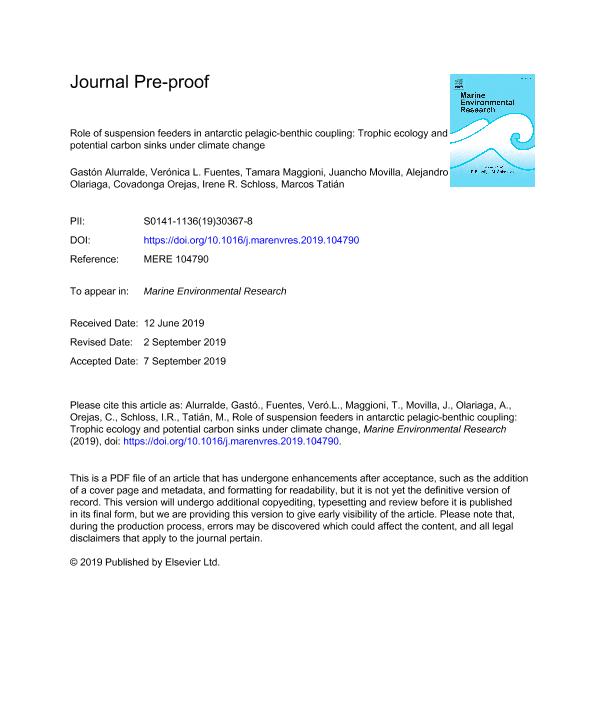Artículo
Role of suspension feeders in antarctic pelagic-benthic coupling: Trophic ecology and potential carbon sinks under climate change
Alurralde, Roque Gastón ; Fuentes, Verónica Lorena
; Fuentes, Verónica Lorena ; Maggioni, Tamara
; Maggioni, Tamara ; Movilla, Juancho; Olariaga, Alejandro; Orejas, Covadonga; Schloss, Irene Ruth
; Movilla, Juancho; Olariaga, Alejandro; Orejas, Covadonga; Schloss, Irene Ruth ; Tatián, Marcos
; Tatián, Marcos
 ; Fuentes, Verónica Lorena
; Fuentes, Verónica Lorena ; Maggioni, Tamara
; Maggioni, Tamara ; Movilla, Juancho; Olariaga, Alejandro; Orejas, Covadonga; Schloss, Irene Ruth
; Movilla, Juancho; Olariaga, Alejandro; Orejas, Covadonga; Schloss, Irene Ruth ; Tatián, Marcos
; Tatián, Marcos
Fecha de publicación:
12/2019
Editorial:
Elsevier
Revista:
Marine Environmental Research
ISSN:
0141-1136
Idioma:
Inglés
Tipo de recurso:
Artículo publicado
Clasificación temática:
Resumen
Sea-ice and coastal glacier loss in the Western Antarctic Peninsula open new ice-free areas. They allowing primary production and providing new seabed for colonisation, both acting as a negative feedback of climate change. However, the injection of sediment-laden runoff from the melting of land-terminating glaciers may reduce this feedback. Changes in particulate matter will affect nutrition and excretion (faeces stoichiometry and properties) of suspension feeders, reshaping coastal carbon dynamics and pelagic-benthic coupling. Absorption efficiency and biodeposition of Euphausia superba and Cnemidocarpa verrucosa were quantified for different food treatments and varying sediment concentrations. Both species showed high overall absorption efficiency for free-sediment diets, but were negatively affected by sediment addition. High sediment conditions increased krill biodeposition, while it decreased in ascidians. Energy balance estimation indicated high carbon sink potential in ascidians, but it is modulated by food characteristics and negatively affected by sediment inputs in the water column.
Archivos asociados
Licencia
Identificadores
Colecciones
Articulos(IDEA)
Articulos de INSTITUTO DE DIVERSIDAD Y ECOLOGIA ANIMAL
Articulos de INSTITUTO DE DIVERSIDAD Y ECOLOGIA ANIMAL
Citación
Alurralde, Roque Gastón; Fuentes, Verónica Lorena; Maggioni, Tamara; Movilla, Juancho; Olariaga, Alejandro; et al.; Role of suspension feeders in antarctic pelagic-benthic coupling: Trophic ecology and potential carbon sinks under climate change; Elsevier; Marine Environmental Research; 152; 104790; 12-2019; 1-54
Compartir
Altmétricas



